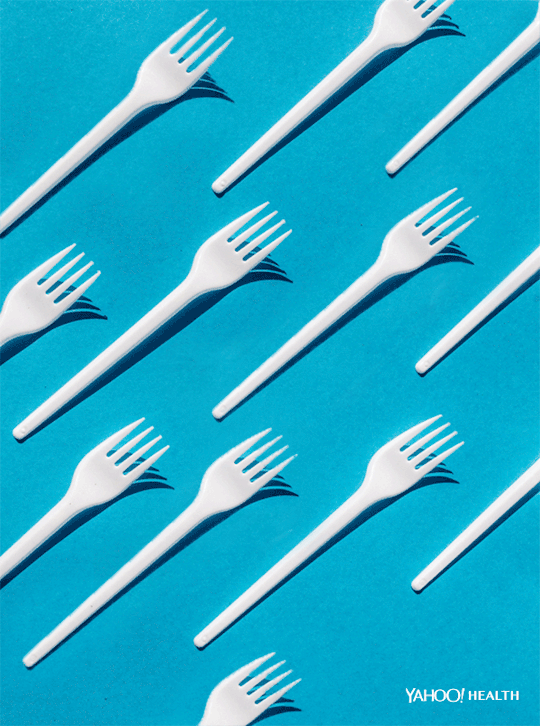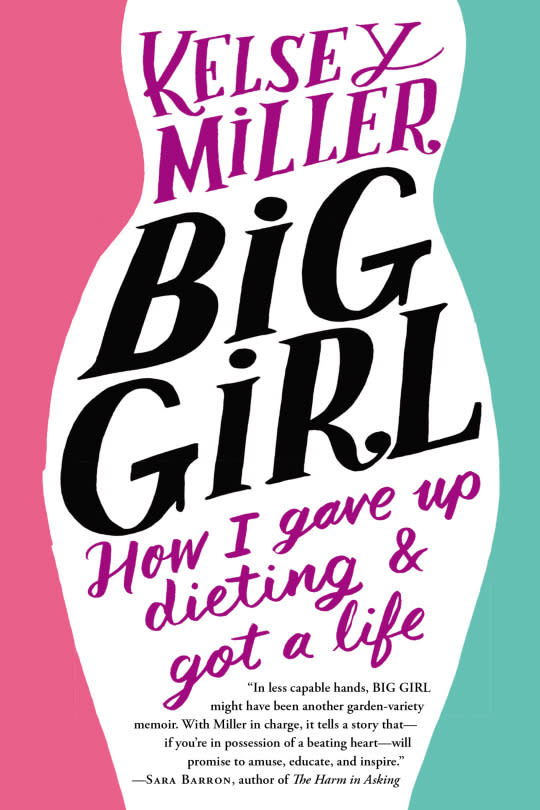How One Writer Gave Up Dieting and Got a Life

Editor Kelsey Miller had gone through dozens of diets, each more frustrating than the last, by the time she was in her late 20s. By 2013, she was done. Done with the diets, the frustration, and the feeling that she was doing something wrong just by existing. So she ditched the diets for good, focusing instead on intuitive eating — the practice of listening to your body’s natural hunger cues, rather than a guide book. Miller recounted the ins and outs in her column for Refinery29, and is now laying it all out on the table in her new memoir, Big Girl.
Read in the excerpt below about her first inklings that something was off with her relationship with food, and learn more about her diet woes and body-peace moments in Big Girl, out now.

I was eight years old the first time I got caught, and the crime was a handful of chocolate chips. I was on the phone with my dad, a nightly ritual. “Adam’s on the phone,” my mother would call, and I’d take the receiver with its endless spiral cord and step inside the pantry, turn on the light, and close the door. “Can’t she say, ‘Your father’s on the phone’?” he’d ask, and I’d lean against the shelves, assessing the goods. Our house was small, my siblings young and loud, and the pantry was the only place a person could close a door that wouldn’t immediately be opened.
“How did the quiz go?”
“Fine.”
“Did you have a sense of how well you did?”
“Fine.”
“Do you know how much I love you?”
“Yeah.”
This conversation was our well-practiced routine. I knew other kids of divorce who treated their long-distance fathers more like relatives than parents. But, though he lived far away, my dad called often enough that I had the luxury of getting bored with him. I spent most of these calls preoccupied with the shelves. My mother had a small catering business, and the closet was perennially jammed with large-batch boxes of baking ingredients and other dry goods. With the door shut, I shook stale sprinkles into my mouth and sucked on cinnamon buttons intended to be noses of gingerbread men.
“Is there something in your mouth?” Dad asked. “What’s that sound?”
“Raisins.”
Raisins were my cover, every time. Though I knew grapes were off limits (“pure sugar,” my mom said), raisins were smaller, harder, and I didn’t like them as much. Their mild grossness made them Good. But on the back shelf of the pantry, tucked among dusty plastic bottles of cake decoration and boxes of Grape-Nuts that nobody ate, was a plastic tub, the size of a fish tank, of Nestlé Toll House Chocolate Chips. This container was the first thing you saw when you opened the door: its giant red top, big yellow label, and enough chocolate chips to bake a batch of five thousand cookies.
We rarely had sweets in the house, and if we did, they were my mom’s pints of Häagen-Dazs coffee ice cream, which were not easy to sneak without making a visible dent. Sometimes I’d find bags of Fun Size candies on top of the fridge, which my stepfather had impulse-bought on a supermarket run. Our nanny, Karen, kept a bucket of leftover Halloween candy next to her bed for months after the holiday. But again, these indulgences were hard to pull off without being detected. Someone might walk into the kitchen before I could get the step stool back in place, or Karen would note the disappearance of all her Reese’s cups. I was good, just not good enough for those illicit treats. James Bond wasn’t good enough.
The Toll House chips were for large-batch baking projects Mom often did as a caterer. They were an ingredient, not a treat, and therefore kept right out in the open. It was like a chocolate loophole. I could lean into the pantry, pretend to grab a can of tuna, and come out with a heaping gob of chocolate in my mouth before anyone would notice. During my nightly dad-calls, I didn’t even need an excuse to be in there. And so I’d take the opportunity to slowly siphon off the contraband from that tub, my desire and terror multiplying as I watched the level go down. I was careful, telling myself I’d take just one handful, and then suck each chip into sweet nothingness on my tongue. But when my palm was empty, warm and chocolate swiped, I knew I’d have to have another. I would hang on, putting it off for five minutes, “fine”-ing my dad on the other end of the phone. And then, my pulse leaping to attention, I’d reach back, silently unscrew the top, plunge my hand into the tub, and pull out another round. It was a moment of extreme daring, a compulsive instinct I had to obey, not only for the pleasure that followed, but the fear of knowing any moment my mother could open the door.
This was the peak of our Food Police phase. Later, that’s how Mom and I would both refer to the years leading up to my first real diet. This was the era of tense, well-supervised meals: her hard gaze on my plate at the dinner table, the raised eyebrow as I reached for another helping of mashed potatoes. Mom wanted to help set me straight and I sorely needed it, budding criminal that I was.
I don’t remember exactly when or how it began, but I know there was a time when I could eat or ask for food without considering the consequences. In one of my grandfather’s photo albums there’s a shot of me somewhere around age four, glancing casually at the camera, tuna sandwich in hand like it was no big deal. Each time I see it, I’m stunned by the moxie on that kid, eating tuna on white bread, and probably with full-fat mayo.
But as long as I’d been conscious of having a body, I had known there was something wrong with it. There was just too much of me, and no one found this more offensive than my mother. It was as if my body was a drunk, vulgar guest I’d brought to the party and couldn’t keep under control.
Her own body fell into the general category of thin. It seemed to me that there were really only two ways to be: thin, pretty, and long hair, or fat, ugly, and who cares what the hair looks like? Mom had swingy blonde hair and long legs made lean with yoga. She always had a pint of coffee ice cream in the freezer, and ate it right out in the open. Even after giving birth to my two siblings, just eighteen months apart, she never crossed over into the realm of fat and loathsome. Baby weight or not, she always had the carriage of a thin woman.
A kid wants her mother to like her, and I was failing. True, I was smart, well behaved, and sweet, but none of that trumped my round little tummy. All that just made me a fat goody-goody. But when Mom declared a Food Police state, I knew it was my chance to get in with the popular crowd. I just had to impress the leader.
This is an excerpt from BIG GIRL by Kelsey Miller. Copyright © 2016 by Kelsey Miller. Reprinted by permission of Grand Central Publishing, New York, NY. All rights reserved.

Body-Peace Resolution is Yahoo Health’s January initiative to motivate you to pursue wellness goals that are not vanity-driven, but that strive for more meaningful outcomes. We’re talking strength, mental fitness, self-acceptance — true and total body peace. Our big hope: This month of resolutions will inspire a body-peace revolution. Want to join us? Start by sharing your own body-positive moments on social media using the hashtag #bodypeaceresolution


